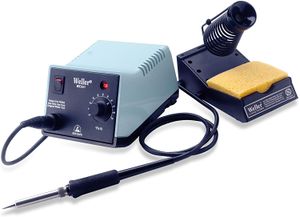Kioskdata-test: Difference between revisions
No edit summary |
No edit summary |
||
| Line 61: | Line 61: | ||
| Tool2 | | Tool2 | ||
| Available | | Available | ||
|} | |||
{| class="wikitable" style="margin:auto" | |||
|+ Caption text | |||
|- | |||
! Header text !! Header text !! Header text | |||
|- | |||
| Example || Example || Example | |||
|- | |||
| Example || Example || Example | |||
|- | |||
| Example || Example || Example | |||
|} | |} | ||
Revision as of 17:51, 10 May 2022
Error while fetching data from URL https://obj.umiacs.umd.edu/hrithik/test-sds.json: $2.
There was a problem during the HTTP request: 403 Forbidden
Error: no local variable "Studio" has been set.
Error: no local variable "Room" has been set.
| Material | SDS Doc | SDS Link | Tool |
|---|
This page is currently under construction.
Description
The Weller WES51 soldering station is used for connecting electrical components and conductors together in a circuit. The soldering iron uses heat to melt solder to form a strong joint that is electrically conductive. A soldering station provides much of the same basic functionality as a soldering iron but adds more precise control of temperature.
Training
Training is required to use this tool. The training module can be taken here.
Trained Managers
The managers that have adopted this tool and can help you with using. Keep in mind these are not the only managers that know how to use this tool, feel free to ask any. Full list of adopted tools can be found here here.
{{#get_web_data:
url=https://docs.google.com/spreadsheets/u/2/d/1OWqoa5hGArO427buM7213HOFsia-I8W9aUs01hW2Gpo/gviz/tq?tqx=out:csv&gid=0&tq=select%20F%20where%20G%20%3D%20%22Soldering%20Station%22 |format=CSV |data=Manager=1
}}
| Manager {{#for_external_table:<nowiki/>
{{!}}- {{!}} {{{Manager}}} }} |
|---|
Manuals
A PDF of the manual can be found here: can be found here
Tips & Tricks
- Preparation
- CAUTION: Ensure that your circuit is completely de-energized and disconnected from any power sources before attempting to solder.
- Use a smoke absorber to mitigate the fumes created while soldering.
- Wet the sponge with water before use (make sure it is damp - not dripping wet).
- Be sure to allow the iron to fully heat up before using. Using an iron that is not at the proper temperature can lead to poor solder joints and will be frustrating to use.
- Tin the tip - cover the soldering iron tip in a layer of solder and wipe it on a wet sponge before making solder joints in your circuit.
- Process
- Apply heat to the components being soldered by touching the tip of the soldering iron directly to the components for about 2 seconds then apply the solder a short distance away from the soldering iron, allowing it to be drawn into the joint.
- The quality of a solder joint can be determined by visual inspection. A good solder joint looks shiny and is shaped like a volcano, while a bad solder joint looks dull or has blobs. A bad solder joint should be resoldered since it will likely have a poor electrical connection.
- Follow-Up
- Allow the connection to cool before moving any wires or components.
- Before turning off the soldering station, tin the tip to protect the metal from corrosion and to ensure the iron works well for the next maker.
- Troubleshooting
- Solder wicks into the work when the work is at the proper temperature. If it is difficult to get solder to wick into the work, then heat from the iron may need to applied for a longer period of time. Some components or wires may take more heat to solder. Speak with a manager if you are having trouble using the soldering station.
Consumables
If you are looking for something on this list, and you cannot find it in the room, tell a manager. We likely have more stock in storage.
- Soldering iron tips
- Soldering station sponge
- Solder
Pandoc MD to MediaWiki Test
Cordless Drill
Description
The cordless drill is a great starter tool. Not only is it versatile, allowing you to drill holes of varying sizes in a plethora of materials but also teaches basic tool handling skills, useful when moving on to other advanced tools.
Tips & Tricks
- Make sure to clearly mark the center of the hole you will be drilling.
- Chose the drill bit according to the type of material you will be drilling into and how big you want the hole to be.
- Make sure the bit is centered and secured in the chuck
- Don’t push the drill bit into the material, apply minimal pressure and let the weight of the drill do the work.
- Always remember to put the battery on charge after using it on the tool wall.
Consumables
- Drill Bits - The primary consumable for this tool are drill bits. In case you find a bit is missing or is broken in the process of using it, please contact a manager.
| Type | Description |
|---|---|
| Tool1 | Maintainance |
| Tool2 | Available |
| Header text | Header text | Header text |
|---|---|---|
| Example | Example | Example |
| Example | Example | Example |
| Example | Example | Example |
